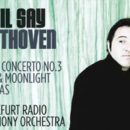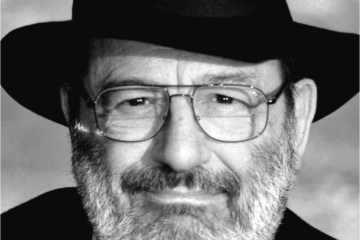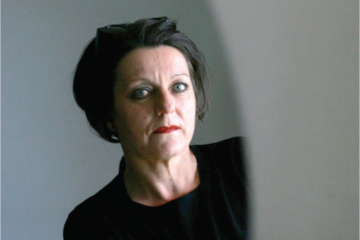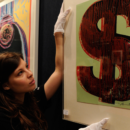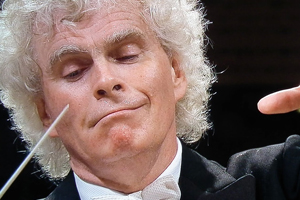
Sir Simon Rattle:”There is a sort of orchestral memory; an ideal of the sound, an ideal of the spirit which keep on living.”
After years in which he transformed the Birmingham Orchestra into one of the most popular British phalanges, Sir Simon Rattle took over the Berlin Philharmonic, managing to continue the tradition of this orchestra, which still keeps the memory of Wilhelm Furtwängler and Herbert von Karajan.
Berliner Philharmoniker performs in Bucharest after almost eighty years. In 1936 it was conducted by Hermann Abendroth and they offered an extraordinary event. What makes the Berliner Philharmoniker the most important orchestra in the world? In your opinion what does it have so extraordinary?
Good question! It’s the kind of mystery you can’t really answer: an extraordinary group of people, an extraordinary history, a special sound, a special care for the sound…it’s a remarkable group, what can I say more?
Why is being the conductor of this orchestra one of the most prestigious positions in the whole musical world?
Oh, I think… a lot of pressure comes with that. But it’s an astonishing instrument to work with; It is a huge job to guide such big orchestras, they are like big ships.
When you started working with Berliner Philharmoniker could you still feel the legacy of Wilhelm Furtwängler in the sound of the orchestra?
Look, it’s an interesting thing with these orchestras, they have a lively history and of course you feel it…I felt Abbado, Furtwängler and all the rest. In some ways it is a wonderful thing because you stand on great shoulders. There is a sort of orchestral memory; an ideal of the sound, an ideal of the spirit which keep on living. That’s very interesting.
At the age of 25 you became the conductor of the City of Birmingham Symphony Orchestra and you conducted there for 18 years. In 2018 you will leave Berliner Philharmoniker after another 18 years in this position; and afterwards you shall conduct London Symphony Orchestra. What is the hidden meaning of these cycles in your career as a conductor?
(Laughs) I like to stay in one place for a longer period of time, I like having musical families. On the other hand, there is a certain amount of time that makes sense, I think. I’ve been a lucky man in that way, but I like the idea of staying with a group of people and getting to know them very well.
Do you have a different repertoire in mind for London Symphony Orchestra, I mean different from what you have conducted so far?
I’ve always tried to do a very wide repertoire… I think all great orchestras need a change, but actually, in the last years the London Symphony Orchestra has played almost no baroque music, but it played a lot of French or Russian music. So, I want to broaden their repertoire because the people are open for anything.
A few months ago Diapason Magazine made a compilation with the best interpretations of Beethoven’s Symphonies. You picked up probably the most violent version of the 9th Symphony, the one of Furtwängler from 1942. Why this choice?
Well, because it’s not only an extraordinary musical testimony but it’s the kind of performance that could only be done in certain historical circumstances. I would say it’s almost too dangerous to listen to something like this. Such a performance doesn’t come along very often because you could feel the desperation that the people were trying to express through that Beethoven piece. All great pieces have various sides to them, but this performance is completely out of the ordinary, it is as though you are looking at the terrible truth right in the face.
Who is the last century`s conductor you would have liked to assist and why?
(Laughs) There are many. But I would choose Bruno Walter.
Have you worked with Romanian musicians so far?
It’s been a long time since. And I can say that they were not many.
Romania despite the “Enescu” Festival looks rather provincial within Europe’s musical world. What should an Eastern European country do in order to have some musical intensity like France or Germany?
I think it takes time. The Festival is a great thing and I am sure it will become more and more well-known! What I know is that we are coming to a very cultivated and musical nation and that’s very exciting.



